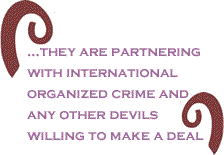
|
|||||||||||||||||||||||

|
|

Custom Search
|
|
 |
|
If you ever felt this whole saga of these invincible maritime desperadoes getting away with the most fantastic piracy operations along the Somali coast is so incredibly bizarre, you are not alone. Regardless of what many media groups have sensationally been reporting, there is not enough information available to adequately explain the nature of this high sea drama or to pinpoint all those who are involved. However, there are some, state and non - state actors, who are openly positioning themselves to be the beneficiaries. That
said, let there be no mistake, the pirates are real. And, like chemical
waste dumping, illegal fishing, weapon smuggling, drug trafficking,
illegal oil exploration, illegal human trafficking, and a host of
other criminal activities, piracy is a thriving business in
Ensuring dominance throughout the region in terms of land, water, and air is the name of the game - a game that historically shattered the region’s aspirations for peace, co - existence and development. The
National Intelligence Council’s report, Global Trends 2025, projects
that the According to the report, as a result of their rapid economic growth, new influential players such as Russia, China, India, and Brazil are not only going to have “a seat at the international high table, (but) will bring new stakes and rules of the game.” The NIC report also makes a daunting projection that in the coming decade or two, powerful nations will be competing for access to resources essential to survival: food, water, and energy. Going back to the pirates: if they did not exist, they would have been invented! Their almost daily criminal activities have dwarfed all other less covered criminal enterprises. This unintended consequence of their actions is paving a way for the architects of chaos, the so-called independent security contractors (ISC) - clandestine military forces immune from all laws and accountabilities. Already,
the American and European ISCs are actively out-maneuvering each
other to position themselves for hefty contracts to escort ships
through the troubled waters of
Here
you may want to restrain your inquisitive urges: How could these
village-dwelling thugs who wear macawis (cultural skirts)
for camouflage gear and dacas (flip-flops) for combat boots
pull such a sophisticated operations? By no means are these high sea hooligans innocent. While they are, on one hand, being used as a gambit or a pretext to geopolitical positioning, they are partnering with international organized crime and any other devils willing to make a deal. Interestingly,
for decades the Straits of Malacca (between Meanwhile,
there are widespread anecdotal accounts of “wealthy businessmen”
from the Piracy
in BlackCommentator.com Guest Commentator, Abukar Arman, is a freelance writer whose articles and analyses have appeared in the pages of various media groups and think tanks. Click here to contact Abukar Arman. |
|
Any BlackCommentator.com article may be re-printed as long as it is re-printed in its entirety and full credit given to the author and www.BlackCommentator.com. If the re-print is on the Internet we additionally request a link back to the original piece on our Website. Your comments are always welcome. eMail re-print notice
If you send us an eMail message we may publish all or part of it, unless you tell us it is not for publication. You may also request that we withhold your name. Thank you very much for your readership. |
|
| |
|
| December 4 , 2008 Issue 302 |
|
| Executive Editor: Bill Fletcher, Jr. |
| Managing Editor: Nancy Littlefield |
| Publisher: Peter Gamble |
| Est. April 5, 2002 |
Printer Friendly Version
in resizeable plain
text format or pdf
format. |
| Frequently Asked Questions |
 |

|
 |
 |
 |
| |
| |





























 During
that period,
During
that period, 
 Pirates
in
Pirates
in 






